2016 China Tax Law Forum and the 5th China Tax Lawyers and Tax Agents Forum
On December 10, 2016, the "2016 China Tax Law Forum and the Fifth China Tax Lawyers and Tax Accountants Forum" was held in Beijing Jingyi Hotel, with the theme of "Supply Side Reform: Fiscal Co-Governance and Tax-Related Service Upgrade". The forum was jointly organized by All China Lawyers Association and China Association of Registered Taxation Technicians, and co-sponsored by Finance and Taxation Law Committee of All China Lawyers Association, Finance and Taxation Law Research Center of China University of Political Science and Law, Beijing Hwuason Law Firm, Huatax Taxation Law Firm, Beijing Zhongrui Yuhua Taxation Firm, and China Taxation Law Firm. More than 500 leaders, experts, professionals and news media friends from the National People's Congress, the Ministry of Finance, the State Administration of Taxation, industry associations, colleges and universities, law firms, tax firms, enterprises and other departments and units attended the forum on site, and more than 12,000 people from all walks of life watched the conference video broadcast online.
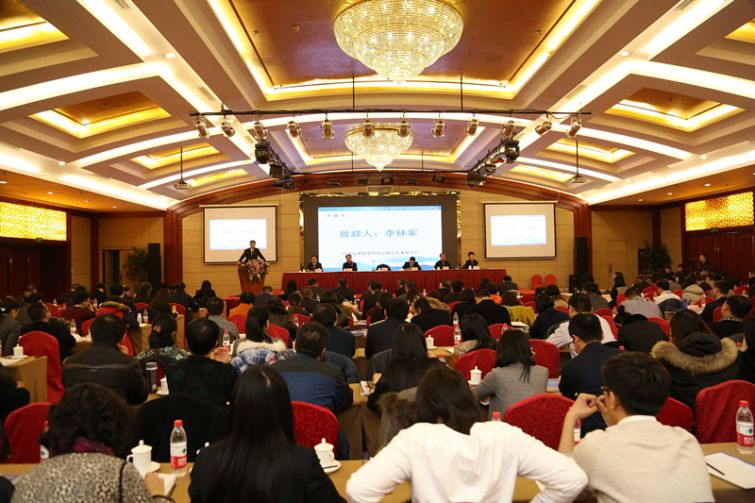
The picture shows the opening ceremony of the forum
The opening ceremony of the forum was held at 9:00 a.m. on December 10, with Dr. Liu Tianyong, Deputy Director and Secretary General of the Professional Committee of Finance and Tax Law of the National Lawyers Association, Director of Hwuason Law Firm, and Chairman of Huazax Taxation Firm Ltd. as the host. Dr. He Yong, Secretary General of All China Lawyers Association, Li Linjun, Vice President and Secretary General of China Association of Registered Tax Practitioners, Liu Jianwen, President of China Association of Finance and Taxation Law and Professor of Peking University School of Law, and Jiang Xin, President of Beijing Association of Registered Tax Practitioners and Former Deputy Director of Beijing Municipal State Administration of Taxation, attended the Opening Ceremony and delivered speeches one after another.
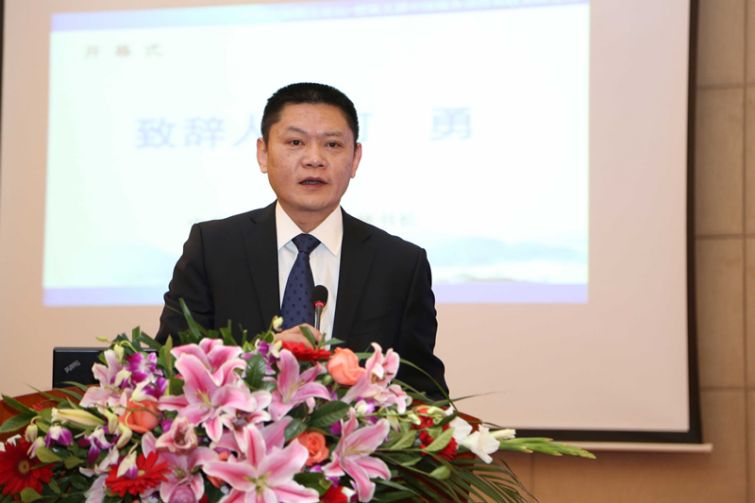
Picture of Secretary General He Yong's speech
Secretary General He Yong pointed out in his speech that the lawyers' profession is now witnessing unprecedented rapid development, and the specialization of lawyers' services has become a major trend in the development of the lawyers' profession. Among them, although the number of tax lawyers represented by Hwuason Law Firm is small, the development trend exceeds the average level of the same industry. Tax lawyers, as professionals proficient in tax-related laws and financial knowledge, have the professional ability to solve complex tax issues. From a neutral or professional point of view, they provide advice and suggestions for the construction of our country's tax law system, which plays an important role in the development of China's tax law and positively affects the level of our future tax legislation, law enforcement and justice. On behalf of the National Lawyers Association, Mr. He Yong, the secretary-general of the National Lawyers Association, put forward several hopes for the tax lawyers, hoping that the tax lawyers can be based on the service of the national fiscal and taxation legislation, assisting in the judicial process of tax disputes, safeguarding the excellent tax law environment, promoting the benign development of the economy, and strengthening the sense of service and responsibility. In order to implement the policy requirements put forward by the opinions on deepening the reform of the lawyers' system, Secretary General He also called on all parties to conduct more in-depth research on how to establish tax policies that are more in line with the characteristics of the lawyers' profession under the current tax law system, and to jointly push forward the healthy, sustainable and safe development of the lawyers' profession.
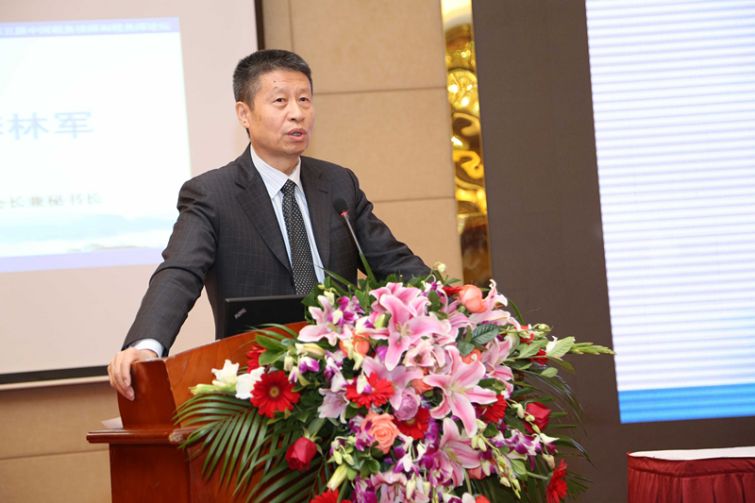
The picture shows the speech of Mr. Li Linjun, vice president of CTRA
In his speech, Vice President Li Linjun firstly congratulated the successful holding of this year's Tax Law Forum on behalf of the China Association of Registered Taxation Technicians, and thanked the organizers of the forum for their hard work and efforts for the success of the meeting. General Secretary Xi Jinping recently presided over the meeting of the Political Bureau of the Central Committee, the main tasks of the economic work in 2017, including continuing to promote the supply-side structural reform and deepening the policy reform of state-owned enterprises, taxation and finance and other areas, both of which run through the theme of this year's Tax Law Forum - the reform of the fiscal and taxation system. At the domestic level, in addition to this year's camp reform, which has been fully rolled out, reform measures will also be introduced for various taxes, including resource tax, environmental protection tax, consumption tax, personal income tax and real estate tax, etc., and synchronized with the reform of tax supervision. At the international level, China has also been promoting international tax reforms, such as BEPS, CRS and other international anti-avoidance measures. These reforms, as well as the reform of the national administrative system, involve tax-related service organizations and institutions. As far as the tax practitioner industry is concerned, the State Council's issuance of a document abolishing the qualification recognition of registered tax practitioners is both an opportunity and a challenge for China's registered tax practitioner industry, and the tax practitioners should improve their own professional skills and strengthen cooperation with lawyers in order to serve taxpayers and the rule of law in China's tax service.

Picture shows the speech of President Liu Jianwen
In his speech, President Liu Jianwen believes that in the context of the era of great development of tax-related services, the highest state of the tax legal system is that taxpayers pay taxes happily. How to realize taxpayers' happy taxation requires a culture, a doctrine and a system. The first is a culture of cooperation and coordination. The positioning of fiscal law as public property law requires respect for taxpayers, and there should not be an unequal and confrontational position between taxpayers and tax authorities. The second is tax legalism, which is a powerful tool for the protection of citizens' personal property rights. In the process of implementing tax legalism, it is particularly important to resolve the relationship between the legislature and the executive, and between taxpayers and the tax authorities. The third is a scientific and reasonable tax law system. Under the guidance of the consciousness of good law and good governance, the pace of China's tax legislation is constantly accelerating. Only on the premise of this culture, doctrine and system can we realize the highest level of the tax law system and provide space for lawyers and tax accountants to play their roles.
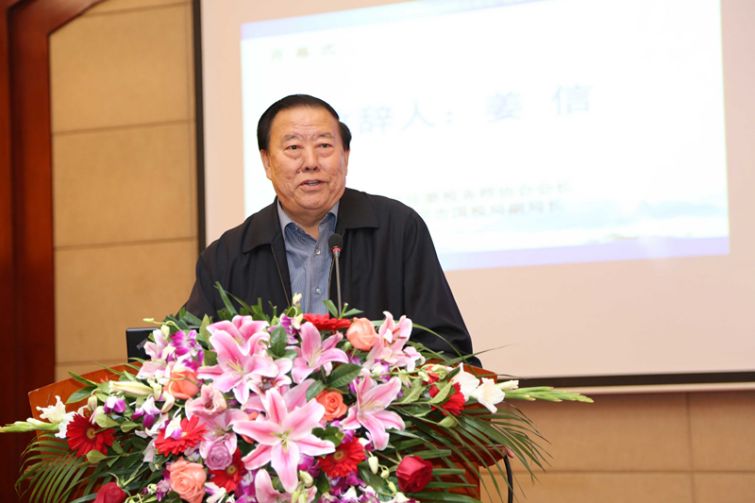
The picture shows the speech of President Jiang Xin
President Jiang Xin pointed out in his speech that the forum brought together lawyers, tax accountants, experts and scholars from all over the world to talk about tax-related services, which is of great significance to the promotion of tax-related services, tax collection and administration and tax reform, and expressed his heartfelt thanks to the organizer of the forum. He pointed out that as one of the organizers, Huajian has been committed to promoting the integration of tax-related services of lawyers and tax accountants for many years, and was the first to put forward the concept of tax lawyers more than ten years ago. As an industry leader and promoter, Huajian has been adhering to the development mode of "tax + law", and at present, in addition to the Huajian Law Firm under the banner of Huajian, Huajian also owns a number of 5A tax firms. At present, in addition to Hwuason Law Firm, Huajian also owns a number of 5A-level tax firms under its banner. He believes that the current situation in China is still far from the rule of law in taxation, in which case the cooperation and integration of tax-related services of lawyers and tax accountants have far-reaching significance. First of all, it can accelerate the process of tax legislation and improve tax collection and management. In addition, the phenomenon of tax evasion by enterprises in China has not been paid enough attention, and this integration can also accelerate the construction of national tax judicial system, in which lawyers should become the main force in the field of tax justice. Mr. Jiang finally expressed his hope that people from all walks of life can make a contribution to the creation of a fair and harmonious society and a fair economic environment through the exchanges and discussions on various topics in the Tax Law Forum.
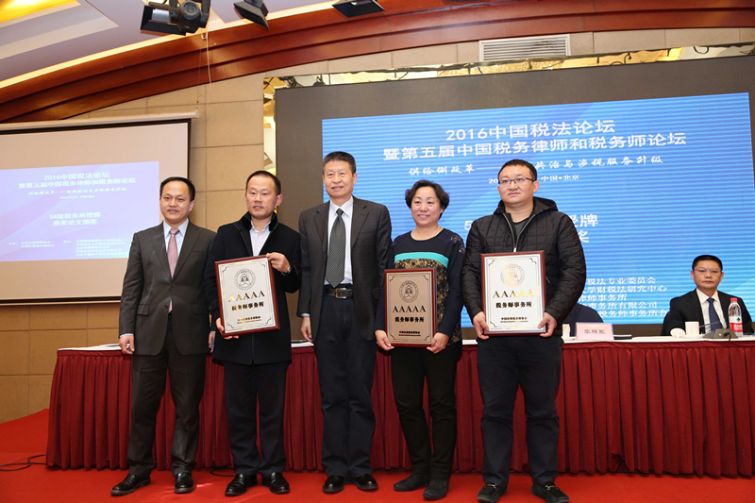
The picture shows Vice President Li Linjun awarding the 3 5A tax offices of Huajian Taxation
According to the meeting agenda, after the forum guests' speeches, Li Linjun, vice president of China Association of Registered Taxation Technicians, on behalf of China Taxation Association, awarded one by one for the 5A tax firms of Huazhou Taxation Firm, which is under the banner of Shanghai, Shanxi, and Hangzhou 3 branches of the 5A tax firms. Thereafter, Mr. Quan Fanglou, vice president of China Association of Registered Taxation Technicians, announced the list of award-winning theses of this forum, and the leaders of All-China Lawyers' Association and China Association of Registered Taxation Technicians presented the awards to the 25 winners and took a group photo together.
This year's forum included five topics, namely: (1) Deepening Reform of the Fiscal and Tax System and Tax Legislation; (2) Revision of the Tax Administration Law and Protection of Taxpayers' Rights and Interests; (3) In-depth Analysis of Recent Tax Dispute Cases and Business Upgrading; (4) Upgrading of Tax-Related Services in the Context of Supply-Side Reform; and (5) Innovation of Tax-Related Professional Services under the "One Belt, One Road" Strategy and International Taxation. (v) "Belt and Road" strategy and innovation of international tax-related professional services.
The first part, titled "Deepening Reform of the Fiscal System and Tax Legislation", was hosted by Duan Aiqun, Deputy Director of the Fiscal Law Committee of the National Lawyers Association. Mr. Li Linjun, Vice President and Secretary General of China Association of Registered Taxation Technicians, Prof. Jia Kang, former Director of Institute of Fiscal Science of the Ministry of Finance, and Mr. Liu Zuo, Editor-in-Chief of China Taxation Newspaper and Vice President of Fiscal and Taxation Law Research Institute, delivered their keynote speeches one after another.
With the topic of "Reform of Fiscal System and Tax-related Professional Services", Vice President Li Linjun pointed out that economic globalization and asset globalization require global taxation and international tax cooperation. Against this background, BEPS (Action Plan for Prevention of Base Erosion and Profit Shifting), CRS (Standard for Automatic Exchange of Tax-Related Information on Financial Accounts) and FATCA (U.S. Overseas Account Tax Compliance Act) came into being in order to strengthen tax collection and management and to combat cross-border tax evasion. Among them, CRS is a common reporting standard published by OECD for automatic exchange of financial account data on tax matters. President Li introduced in detail the specifics of the purpose of CRS, the scope of accounts under investigation, account amount limitations, subjects of due diligence, specific contents of account information to be reported to the tax authorities, the risks of not conducting due diligence, and the risks to taxpayers. China initialed the FATCA intergovernmental agreement in the United States on June 26, 2014, the State Administration of Taxation ("SAT") issued the Due Diligence Investigation of Tax-Related Information on Non-Resident Financial Accounts (Draft for Public Comments) on October 14, 2016, and the full-scale on-line launch of the Golden Tax III, etc., which have all contributed to the further standardization of the tax levy and administration, and the stricter and stricter tax audits of tax violations, and increased demand for tax-related services from various types of taxpayers. The demand for tax-related services from various types of taxpayers has increased. Tax accountants and tax lawyers should strengthen business complementarity and strategic cooperation, and explore the Internet + tax-related service platform to adapt to the new situation and mission of modernization of tax governance and the rule of law.
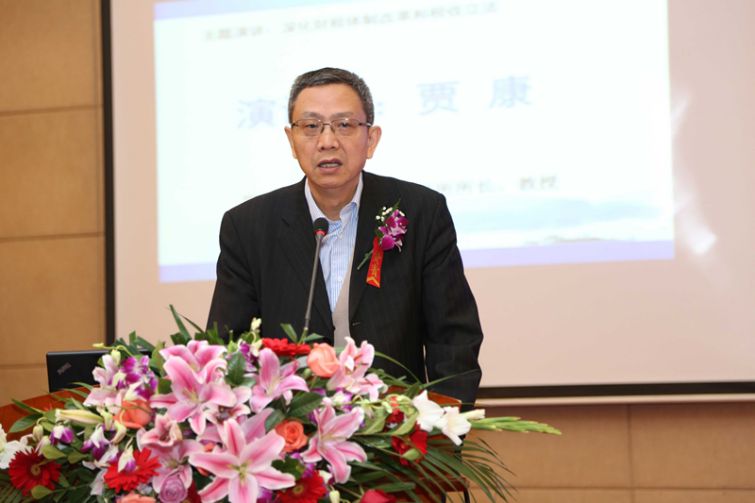
The picture shows Prof. Jia Kang's speech
Professor Jia Kang spoke on the topic of "Fiscal and Tax Reform from the Perspective of Supply-Side Reform", believing that supply-side reform is to solve the problem of how to actually promote the reform in the new stage of the reform, which includes the supporting reforms of fiscal and taxation, including the reforms of budgetary management, tax reform, and reforms of rationalizing the relationship between the central and local governments, which is the foundation and an important pillar of the whole modernized system of national governance. As the foundation and important pillar of the modernized governance system of the whole country, it must play a role in the reform of the overall situation. At present, the camp reform has been fully rolled out, and the resource tax reform and environmental protection tax reform are also being further promoted. The core of supply-side reform is to strive to realize the supply of systems with good laws to follow, which leads to the interpretation of the connotation of tax legislation. According to Mr. Jia Kang, the first level of tax law is to put public power into the cage of the rule of law; the second level is to upgrade the legal status of each tax-related provision under the current tax system; and the third level is to combine democracy and the rule of law, and ultimately to move towards a republic. In the process of promoting supply-side reform and implementing tax legislation, it is necessary to optimize legal services, especially for lawyers to play an irreplaceable role in modern society, so as to realize that the rule of law and cultural soft power echo each other.
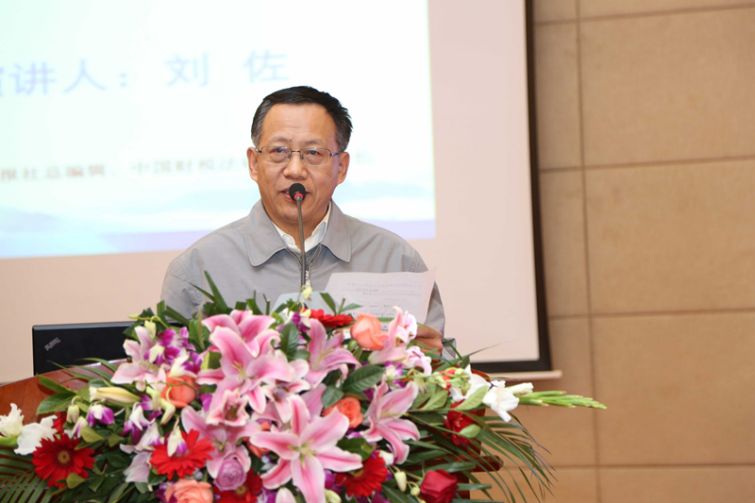
The picture shows the speech of Editor-in-Chief Liu Zuo
Mr. Liu Zuo, vice president of the company, took the topic of "Analysis of Hot Issues of Current Key Tax Reforms and Tax Legislation", and started from four aspects, namely, the relationship between reforms and legislation, steps of reforms and legislation, timeframe of reforms and legislation, and preparations for reforms and legislation. As for the relationship between reform and legislation, tax reform is the basis of tax legislation, and tax legislation can also promote tax reform, and the "merger of two laws" on enterprise income tax in 2007 has successfully pushed back the tax reform. Second, in terms of the steps of reform and legislation, both of them can be implemented simultaneously and promoted gradually, for example, the reform of personal income tax can be promoted gradually by implementing a combination of comprehensive and categorized collection methods; it can also be piloted first and promoted gradually, for example, the reform of real estate tax, which may be difficult to promote nationwide at one time, and it can be promoted gradually by implementing pilots in some cities first. Third, the timeframe of reform and legislation, tax reform and legislation of various taxes are time-critical and burdensome, and should be pushed forward with a countdown mindset. Fourth, in terms of preparation for reform and legislation, democracy should be further promoted, the contents should be made public, opinions should be fully solicited, and the role of experts in various fields should be brought into full play; it is also required to lay a good foundation, clarify the relevant theories of tax law and concepts, and be based on facts and laws, supported by reliable data, and to realize the coordination of the relevant parties.
After the keynote speeches, Mr. Liu Jianwen, president of China Association of Taxation Law and professor of Peking University, and Mr. Feng Xiaobin, professor of the Department of Economics of the National School of Administration, commented on the speeches.
The second part of the session, entitled "Revision of Tax Administration Law and Protection of Taxpayers' Rights and Interests", was chaired by Xu Li, Director of the Professional Committee of Finance and Taxation Law of Guangzhou Lawyers Association. Li Wanfu, Director of Taxation Research Institute of State Administration of Taxation, Yang Xiaoqiang, Professor of Taxation Law and Asset Appraisal Law and Director of Taxation and Fiscal Law Research Center of Sun Yat-sen University Law School, and Ma Zeng, Partner of Deloitte Touche Tohmatsu delivered keynote speeches respectively.
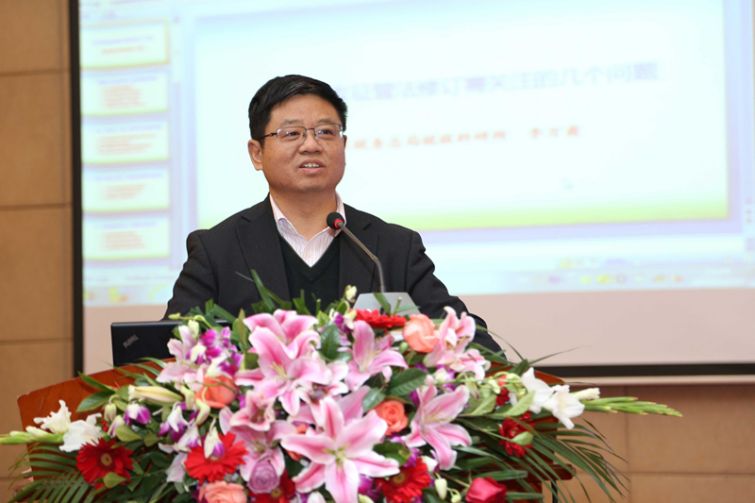
Picture shows the speech of Mr. Li Wanfu
With the title of "Cracking the Difficulties of Revising the Tax Administration Law", Mr. Li Wanfu analyzed the direction of China's tax administration reform by combining his own participation in the revision of the Tax Administration Law and his many years of experience in tax collection and administration. He believes that the revision of the Tax Administration Law should be carried out on the basis of summarizing China's tax administration practice and absorbing international experience in tax administration. Firstly, the most urgent task of the revision of the tax administration law is to build a tax administration system for natural persons to meet the needs of direct tax reform; secondly, it is to strengthen the concept of "tax is the most important thing", and on the basis of which to promote the provision of third-party tax-related information by other government departments and market players; thirdly, it is to take the opportunity to implement the "Program for Deepening the Reform of the State and Local Tax Administration System" and the "Program for Deepening the Reform of the State and Local Tax Administration System". The third aspect is to take the implementation of the "Program for Deepening the Reform of the State Tax and Local Tax Collection and Management Systems" as an opportunity to promote the legalization of the achievements of the tax collection and management reforms, and to provide strong legal support for the tax collection and management reforms; the fourth aspect is to enhance the certainty of taxation, which is not only embodied in the tax entity system, but also requires certainty in the tax collection and management procedures, so as to realize the protection of taxpayers' legitimate rights and interests; the fifth aspect is to implement the BEPS action plan, and to enhance the power of international discourse on taxation. The fifth point is to implement the BEPS action plan to enhance the international discourse on taxation; the sixth point is that tax collection and administration under the digital economy needs the support of the legal system, as suggested by Mr. Li Wanfu.
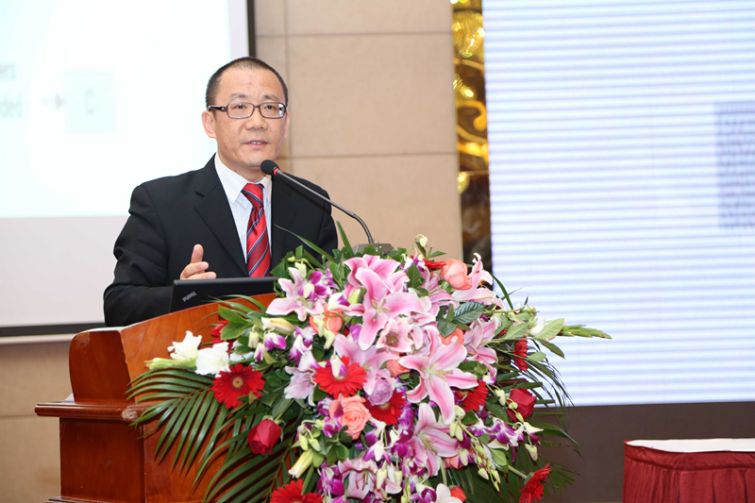
The picture shows the speech of Prof. Yang Xiaoqiang
Prof. Yang Xiaoqiang spoke on the topic of "VAT Treatment of Contracts Involving Others", pointing out that the essence of VAT is to tax the sale of goods and services, which is a kind of transaction tax, contract tax and indirect tax. The collection of VAT is based on contracts, which usually involve two parties, but contracts involving multiple parties, such as insurance contracts, trust contracts and financial leasing contracts, are also very common. The first issue presented by the VAT treatment of other contracts is how to resolve the three streams. The unity of the three streams requires that the entity that provides the payment, the entity that issues the invoice, and the entity that provides the labor is the same. He believes that the problem of triple taxation will be solved as long as the relativity of the contract is upheld in the VAT treatment of other contracts. The second issue is the definition of the nature of taxable behavior. Finally, Prof. Yang Xiaoqiang explained the EIT and VAT issues of the group company's internal unified loan and repayment business. The unified loan and repayment does not belong to the related transaction, and the subordinate units can share the interest to be deducted before the EIT. If a group company receives interest from its subordinate units at a level not higher than the borrowing rate of financial institutions, it is exempted from VAT; if a group company receives interest from its subordinate units at a level higher than the borrowing rate of financial institutions, it should pay VAT in full.
With the topic of "Challenges in Tax Administration Reform and Tax Services", Mr. Ma analyzed the new challenges faced by taxpayers and the development trend of the tax service industry on the basis of various initiatives of tax administration reform. It is proposed that under the background of tax administration reform, China's tax administration is characterized by gradual standardization, decentralization and shift of the center of gravity of tax administration, professionalization of tax source management by tax authorities, and modernization of tax inspection. Under this trend, taxpayers' tax law risks have increased accordingly, and taxpayers are faced with various new challenges such as lack of tax policies, lack of clarity, and different understanding of tax policies. These changes in the tax administration environment simultaneously bring challenges and opportunities to tax service intermediaries, and to some extent are driving changes in the tax service industry. These changes require strategic insights and diversified professional and technical capabilities for tax services in the new era, which is why the proportion of tax practitioners with legal backgrounds in professional tax service intermediaries is increasing; and also require the realization of information and data management to integrate global resources in order to respond to the changes in tax administration and lead the needs of clients.
After the keynote speeches, Yuan Sengeng, professor of the Party School of the State Administration of Taxation and part-time lawyer, Cai Chang, director of the Department of Taxation and Financial Management of the Central University of Finance and Economics, and Ge Hailin, vice president of Huatax Taxation Firm, commented on the speeches.
The third part, titled "In-depth Analysis of Recent Tax Dispute Cases and Business Upgrading", was presided over by Zhou Xuzhong, Secretary General of China Association of Tax Law and Professor of Law School of Capital University of Economics and Business. Mr. Zhang Xuerui, Deputy Director General of the Department of Policies and Regulations of the State Administration of Taxation (SAT), Mr. Zhao Tingting, Deputy Director of the Tax Policy Service Group of PricewaterhouseCoopers (PwC) China and Deputy Director of the Review and Response Division of the Department of Regulations of the SAT, and Mr. Chen Bin, Director of the Finance and Taxation Committee of the Law Society of Jiangsu Province, delivered keynote speeches one after another.

The picture shows the speech of Zhang Xuerui, Deputy Director General
Mr. Zhang Xuerui, Deputy Director General of the Department of Taxation, spoke on the topic of "Giving full play to the role of administrative reconsideration as the main channel for resolving tax administrative disputes", and firstly summarized the characteristics and trends of tax administrative reconsideration and tax administrative litigation cases in recent years. Secondly, there is a rising trend in the proportion of non-tax dispute cases such as disclosure of information, prosecution of tax violations, etc. Thirdly, the claims of taxpayers in some tax dispute cases are not clear; fourthly, the proportion of tax dispute cases resolved through administrative reconsideration is higher; and fifthly, the number of cases resolved through mediation is high. Secondly, tax dispute settlement is currently facing new situation and new requirements, and he proposed that the reform of tax administrative reconsideration system should reflect the due status of taxation, the balance of power and rights, and the system of reconsideration system to safeguard the legitimate rights and interests of taxpayers, and at the same time, it is also necessary to take into account the cost of the reform and the efficiency of law enforcement. When revising the Levy Control Law to solve the "two front" problems of tax prepositioning and review prepositioning, it is necessary to strike a balance between tax security and the legitimate rights and interests of taxpayers. In addition to reconsideration and litigation as the two channels for tax dispute resolution, he believed that tax law service providers such as tax lawyers and tax accountants are the lubricants for tax disputes between taxpayers and tax authorities, and should play an indispensable role in realizing the goal of maintaining the order of tax collection and administration.
Zhao Tingting, Deputy Director, analyzed the causes of tax disputes, ways to solve tax disputes, and the resolution of tax disputes by analyzing typical cases under the title of "Promoting Tax Dispute Resolution and Improving Tax Policies". She proposed that tax disputes arise between taxpayers and tax authorities due to irregularities in tax enforcement and imperfections in tax policies, and that tax disputes can be resolved through communication and coordination, petitions, administrative review and litigation. Among them, tax administrative reconsideration and tax administrative litigation, as a legal remedy system, can resolve tax disputes, provide relief for taxpayers and supervise tax authorities, but they have the disadvantages of passivity and limitation. Both tax administrative reconsideration and tax administrative litigation have shown rapid growth in recent years, with tax administrative reconsideration disputes showing diversity and focusing on the general administration and provincial bureaus; tax administrative litigation is characterized by concern for both entities and procedures. Finally, through the sharing of several cases, the goal of tax dispute resolution is not only to realize justice in individual cases, but also to promote the improvement of policies to a certain extent.
Director Chen Bin shared a case of tax dispute over equity transfer under the title of "Analysis of the Latest Typical Tax Dispute Cases", in which the tax authorities determined that it constituted an indirect equity transfer according to the State Administration of Taxation [2009] No. 698, and demanded the transferring enterprise to pay the EIT, and the enterprise disputed with the tax authorities over whether it had the tax obligation. The focus of the dispute was whether the equity transfer had economic substance and reasonable commercial purpose, and whether the transferring enterprise abused its organizational form. He made a legal analysis of the above two controversial focuses of the case in light of the provisions of State Taxation Letter [2009] No. 698 and State Administration of Taxation Announcement No. 7 of 2015. By analyzing the case, Director Chen Bin believed that when a tax dispute arises, one should carefully study the tax regulations and policies to grasp the purpose and spirit of tax legislation. In addition to the legal remedies of tax administrative reconsideration and tax administrative litigation, it is also becoming a trend to seek alternative dispute resolution methods such as settlement and mediation to resolve tax disputes.
After the keynote speech, Dr. Liu Li, Deputy Director of Inspection Department of Beijing Municipal Bureau of Local Taxation and Doctor of Economics, Teng Xiangzhi, Director of Case Study Center of Finance and Taxation Law of Chinese Academy of Social Sciences and Associate Researcher of Institute of Finance and Economics, and Zhang Qingzheng, Deputy Director of Finance and Taxation Law Committee of Shanxi Lawyers' Association, commented on the speech.
The fourth part, titled "Upgrading Tax-Related Services in the Context of Supply-Side Reform", was hosted by Liu Ying, Deputy Director and Secretary General of Taxation Research Institute of Capital University of Economics and Business. Mr. Wei Zhibiao, Partner of Beijing Hwuason Law Firm, Dr. Li Hui, President of Beijing Zhongshi Shengda Taxation Firm, Doctor of Laws, Post-doctoral Fellow of Melbourne University in Finance and Taxation Law, and Mr. Wang Shutong, Senior Partner of Zhongrui Yuehua Taxation Firm, delivered their keynote speeches respectively.
Mr. Wei Zhibiao spoke on the topic of "Tax Preferential Application Service under Filing System", pointing out that under the requirements of tax administration in accordance with the law and the positioning of service-oriented government, the State Council cleans up the relevant administrative approvals in the form of departmental rules and regulations, normative documents, etc., and some of the tax preferential matters are changed from examination and approval system to filing system, and from prior examination and approval to management in the course of examination and approval, After the fact management. Under the filing system, taxpayers are legally responsible for the authenticity and legality of the relevant information, and this change brings a series of legal risks in administrative law and criminal law for taxpayers applying for tax preferences. And the filing system in the implementation of the name of the record is actually approval, filing requirements are unreasonable and illegal, tax concessions can not be realized and other issues. Finally, Mr. Wei pointed out from the perspective of tax lawyers' own work that the above two factors have created a huge service space for tax law service organizations and prompted the upgrading of tax law services. This background puts forward the following requirements for tax law service organizations: firstly, to maintain neutrality, they should do due diligence and fully understand the situation of clients when providing consultation and planning; secondly, to insist on legitimacy, and the relevant professional programs should maintain compliance; thirdly, to have reasonableness, a series of tax administration reforms, such as the comprehensive on-line of Golden Tax III, have completely changed the situation of asymmetric information of tax enterprises, which puts forward higher requirements of reasonableness of tax consultancy and tax planning; and thirdly, to have rationality. This has put forward higher requirements on the rationality of tax consulting and tax planning. Fourthly, it highlights the consulting nature, and tax law service professional organizations should clarify their rights and obligations in the service agreement.
Mr. Li Hui, the president of the company, presented the topic of "Frontier of Tax Planning for M&A and Reorganization", and firstly put forward the three legislative significance of the relevant provisions of the tax law on asset transfer, which led to the discussion on the tax treatment of cross-border reorganization. He believed that the legal documents on tax treatment of enterprise reorganization are mainly constructed around three basic logics, and that enterprises can only enjoy special tax treatment in M&A and reorganization if they satisfy the objective elements of continuity of shareholders' rights and interests, continuity of business as well as the subjective elements of reasonable business purpose. Then he analyzes a case of intra-group cross-border reorganization and argues that "reasonable commercial purpose", as a general anti-avoidance rule, has ambiguity and uncertainty, which makes the tax authorities have a large space of discretion in determining the application of special tax reorganization, and it is easy to make the taxpayers' rights suffer from infringement. He believes that it is necessary for China to stipulate specific anti-avoidance rules to solve the tax avoidance risks arising from the process of enterprise reorganization, encourage and support the application of special tax treatment in enterprise reorganization after meeting the requirements of anti-avoidance, and reduce the practice of tax authorities to deny the application of tax-exempt reorganization on the basis that it does not have a reasonable business purpose through the clarification of the anti-avoidance rules, so as to enhance the certainty of the rules' application. Finally, he emphasized that enterprises should pay attention to the operation mechanism and legislative logic of the relevant provisions on special tax treatment when they carry out restructuring, and on the basis of which they should judge whether the statutory requirements for special tax treatment are met.
Mr. Wang Shutong, a tax accountant, took the topic of "Tax Accountant Service Oriented by Client's Demand" as the main line of demand generated by contradiction, and explained that under the three kinds of contradictions, namely, the contradiction between the internal demand of the enterprise and the lack of resources, the contradiction between the two parties of collection and payment, and the contradiction between the updated tax collection and management technology and the adaptive ability of the enterprise, the clients would accordingly produce Under these three contradictions, clients have diversified demands for tax services, such as remittance business, tax agency, daily tax consulting, tax due diligence, tax training and so on. However, in some tax services, the responsibilities and obligations of tax accountants and clients are not yet clear, which is also a major obstacle for tax accountants to carry out these services, and it is hoped that this will be implemented in other relevant laws and regulations such as the Tax Administration Law in the future. Finally, he suggested that tax accountants should keep up with the development of the society and rationally face the opportunities and challenges brought by the ever-changing needs of their clients, so as to better protect the interests of their clients and make the tax environment of the whole society more harmonious.
After the keynote speeches, Dr. Mei Yuehua, Director of Taxation Department of Beijing Municipal Bureau of Finance and Doctor of Economics, Dr. Sun Ping, Vice President of Huatax Taxation Firm and Doctor of Management, and Mr. Gao Yunbin, Director of Jiangsu Guorui Xingguang Taxation Firm, commented on the speeches.
The fifth part, titled "'Belt and Road' Strategy and Innovation of International Tax-related Professional Services", was hosted by Dynasty Hui, Director of Tax Law Committee of Beijing Lawyers Association. Mr. Gao Feng, Researcher of International Department of State Administration of Taxation, Mr. He Yang, Vice Dean of School of Finance and Taxation of Central University of Finance and Economics, and Mr. Duan Tao, Partner of King & Wood Mallesons, delivered their keynote speeches successively.
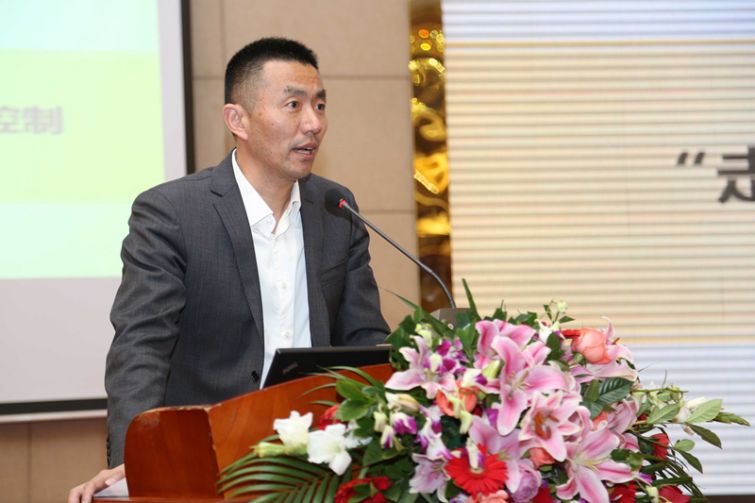
The picture shows the speech of Mr. Gao Feng
With the topic of "Tax Risk Prevention for Chinese Enterprises Going Global", Mr. Gao Feng firstly revealed the tax-related risks faced by enterprises going global against the background of the accelerated development trend of enterprises going global in recent years. This includes the risk of anti-globalization trend in the economic field, anti-globalization will cause policy adjustments, and this uncertainty is a risk factor for going out enterprises; the risk in the tax field, since 2008, the global tax rules have entered into a period of deep adjustment, which is a kind of potential risk for the going out enterprises; and the risk of the host country, which is mainly the political risk of the government's default and the lack of transparency of the business rules. In order to provide risk protection for enterprises going abroad, tax treaties provide a relatively certain tax environment for enterprises going abroad through tax reduction and exemption to reduce the tax burden abroad, eliminate double taxation and prevent discriminatory treatment; in case of tax disputes, the host country's domestic laws and tax treaties also provide dispute resolution mechanisms such as administrative reconsideration, administrative litigation, or mutual negotiation for enterprises going abroad.
Mr. He Yang, Vice President of BEPS, shared with the audience the specific contents of the 15 BEPS action plans, which have been adopted by different countries to different degrees, under the title of "BEPS Action Plans and the Latest Progress of International Anti-Tax Avoidance". According to the feedback of developing countries on the BEPS action plans, developing countries pay more attention to interest deduction and capacity building, and the areas that the BEPS action plans will have a significant impact on the countries may still lie in the digital economy, transfer pricing, and the automatic exchange of international tax information mechanism. Finally, it is concluded that although the degree of adoption of the BEPS Action Plan varies from country to country due to different international tax rules and capacities, the impact of the BEPS Action Plan in combating international tax avoidance and mitigating base erosion and profit shifting in the field of international taxation is self-evident. The most effective element of the BEPS Action Plan is to enhance transparency, which is an opportunity for all tax-related industries. Tax transparency is an opportunity and a challenge for all tax-related industries.
With the topic of "Tax Risk Management and Planning Practice for Cross-border Investment", Mr. Duan Tao proposed that the main tax considerations for enterprises to make overseas investment include the following: firstly, the choice of investment organization form, specifically analyzing whether the organization form of overseas dispatch, overseas branch or overseas subsidiary should be adopted; secondly, the choice of investment method, of which direct investment and indirect investment are each of them, and secondly, the choice of investment method. Secondly, it is the choice of investment method, in which direct investment and indirect investment have their own advantages and disadvantages; thirdly, it is the choice of offshore investment place, the traditional tax haven will bring certain risk to the enterprise in the context of international anti-tax avoidance, the enterprise can take the structure of double holding company; fourthly, it is the consideration of target company's tax burden, the enterprise should try to reduce the tax burden of the target company and its shareholders when it carries out the offshore investment. Subsequently, Mr. Duan combined with specific cases to summarize that when enterprises going abroad make overseas investment, they should pay attention to the tax authorities' supervision of controlled foreign companies, anti-avoidance of tax, capital weakness, financial audits, and relevant requirements of foreign exchange control; consider the impact of tax base erosion and profit transfer, increase the economic substance as much as possible, and avoid setting up the target enterprise directly in a tax haven; and make full use of the tax agreement and the domestic tax law of the host country, The tax treaty, the domestic tax law of the host country and the domestic tax law of the target country should be fully utilized to reduce the tax burden of the relevant subjects.
After the keynote speeches, Dr. Deng Yuanjun, Director of Finance Department of Beijing Municipal State Taxation Bureau and Doctor of Economics, Xu Yan, Associate Professor of the Institute of Comparative Law and Director of Hong Kong, Macao and Taiwan Law Research Institute of China University of Political Science and Law, and Cao Mingxing, Director of International Taxation Research Center of Central University of Finance and Economics, commented on the speeches.
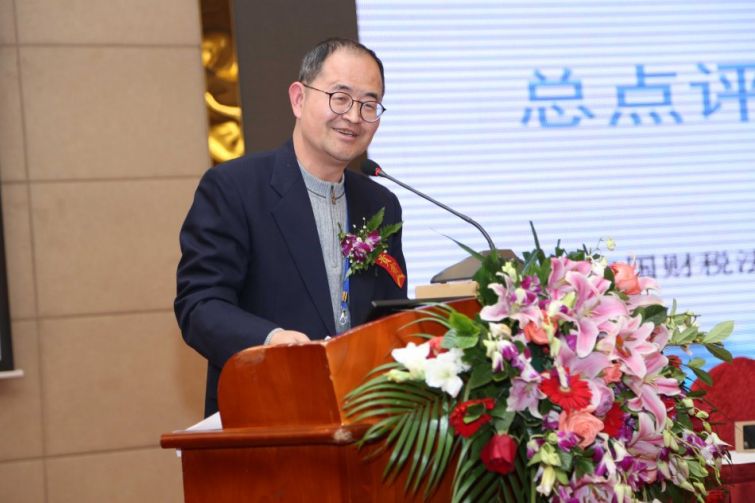
The picture shows that Mr. Liang Wenyong, the president, made a general comment
After the five sessions, Mr. Liang Wenyong, Executive Director of China Institute of Taxation and Rule of Law Strategies, made a final summary and comment on the content of the forum.
The closing ceremony of the forum was held at 19:00, with Director Hou Hongwei of China Association of Registered Tax Accountants as the moderator, and Liu Tianyong, Deputy Director and Secretary General of Finance and Taxation Law Committee of the National Lawyers Association and Director of Hwuason Law Firm, delivering the closing speech, who firstly, on behalf of the organizer, thanked all the experts and leaders for their attendance and wonderful speeches, as well as the organizers, the All-China Lawyers Association and the Association of Registered Tax Accountants for their concern and support for the forum over the years. China Tax Law Forum and China Tax Lawyers and Tax Accountants Forum has now developed into the highest platform for the combination of theory and practice in the field of finance and taxation law, which plays a role in the exchange and integration of the two major professions of lawyers and tax accountants, and has a strong vitality and appeal. Huatax has made useful attempts to the mutually beneficial cooperation and development of the two industries over the years, and is willing to join hands with more law firms, accounting firms and tax accountant firms in cross-border cooperation, and continue to promote the country's rule of tax in accordance with the law, to protect the legitimate rights and interests of taxpayers, and to build a new stage of common governance of finance and tax.
China Tax Law Forum and China Tax Lawyers and Tax Accountants Forum" has been successfully held for five consecutive years in 2010, 2011, 2013, 2014 and 2015, and the convening of this year's Tax Law Forum coincides with the opening year of China's "13th Five-Year Plan (2016-2020)". The convening of this year's Tax Law Forum coincides with the opening year of China's "13th Five-Year Plan (2016-2020)" and the eve of the 19th National Congress of the CPC, where the tax reform and tax legislation are ushering in a period of rapid development and in-depth adjustments, and key reforms and legislation, including the camp reform and VAT legislation, the reform of the comprehensive personal income tax system and the revision of the law, the reform and legislation of real estate tax, and the reform of the tax levy and the revision of the Tax Levy and Administration Law, are being actively promoted. Under the theme of "Supply Side Reform: Common Governance of Finance and Taxation and Upgrading of Tax-Related Services", this year's forum centered on the key role of finance and taxation in supply side reform, and tax officials, tax law scholars, tax lawyers as well as tax accountants and corporate finance personnel gathered to exchange ideas and talk about reform of the rule of law on finance and taxation. The social attention and participation reached an unprecedented level. The successful convening of this forum will play a more positive role in the in-depth implementation of the spirit of the Third, Fourth and Fifth Plenary Sessions of the 18th CPC Central Committee, the full implementation of the principle of tax law, and the continuous leading of the industry development, business innovation and strategic cooperation of Chinese tax lawyers and tax accountants; in the future, the forum will continue to explore the major topics and cutting-edge issues in China's construction of the rule of law in taxation as its own responsibility, and actively promote the reform of the national taxation system and the construction of the rule of law in finance and taxation. In the future, the forum will continue to explore major topics and cutting-edge issues in the construction of the rule of law in taxation in China, and actively promote the national fiscal and tax reform and the construction of the rule of law in taxation!





